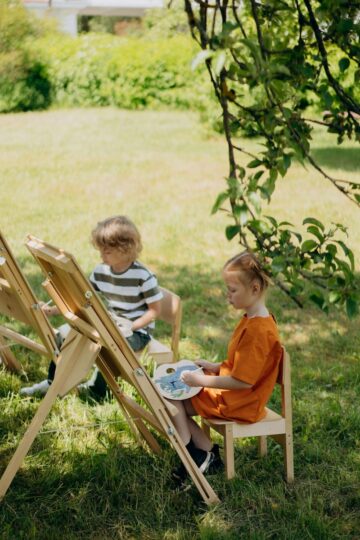
In today’s fast-paced digital age, it’s crucial to recognize the value of outdoor play for children. The natural world offers a myriad of opportunities for growth, learning, and well-being. From exploring the wonders of nature to engaging in physical activities, outdoor play provides an enriching experience that positively impacts a child’s development. In this article, we will delve into the transformative power of outdoor play, highlighting its benefits and offering practical examples.
The Benefits of Outdoor Play
Outdoor play encompasses a wide range of activities, from running and climbing to imaginative play and nature exploration. Engaging in these experiences can have profound effects on a child’s growth, learning, and overall well-being.
- Physical Development: Outdoor play encourages physical movement, helping children develop gross motor skills, coordination, and balance. Activities such as climbing trees, running, or riding a bike strengthen muscles and promote overall fitness.
- Cognitive Development: Nature provides a rich learning environment for children. Exploring outdoor spaces stimulates curiosity, observation, and problem-solving skills. It also enhances creativity and imagination as children engage with natural elements and open-ended play opportunities.
- Emotional Well-being: Spending time in nature has a positive impact on a child’s emotional well-being. Outdoor play reduces stress levels, promotes relaxation, and fosters a sense of calmness. Connecting with nature can also boost mood, resilience, and self-esteem.
- Social Skills: Outdoor play often involves interaction with other children, fostering the development of social skills such as cooperation, communication, and negotiation. Whether building sandcastles at the beach or playing a game of tag in the park, children learn to navigate social dynamics and build relationships.
Promoting Outdoor Play
As parents and caregivers, it’s essential to create an environment that encourages and supports outdoor play. Here are some practical ways to promote outdoor play for children:
- Carve Out Dedicated Outdoor Time
Set aside dedicated time each day for outdoor play. Create a schedule that allows children to engage in unstructured play in nature. Whether it’s after school, on weekends, or during family outings, prioritize outdoor time as an integral part of a child’s routine.
- Provide Access to Natural Environments
Ensure that children have access to natural environments where they can freely explore and play. This can include local parks, nature reserves, gardens, or even a backyard with trees and green spaces. Exposure to different outdoor settings allows children to experience the diversity of nature and its various benefits.
- Encourage Unstructured and Imaginative Play
Promote unstructured play, where children have the freedom to create their own games, explore their surroundings, and engage in imaginative play. Encourage them to use natural materials like sticks, rocks, and leaves to build forts, create art, or invent their own stories.
- Incorporate Nature-Based Learning
Integrate nature-based learning opportunities into a child’s educational journey. This can involve field trips to botanical gardens, and nature centers, or participating in outdoor science experiments. By connecting academic concepts with real-world experiences in nature, children develop a deeper appreciation for the natural world.
- Be a Role Model
As adults, we have a crucial role in inspiring children to embrace outdoor play. Be a positive role model by engaging in outdoor activities yourself. Demonstrate your own enthusiasm for nature and outdoor play by participating in hikes, picnics, or gardening. Show your child that you value and prioritize spending time in nature, and they will be more likely to follow suit.
Examples of Outdoor Play
Let’s explore some examples of outdoor play activities that can enhance growth, learning, and well-being for children:
- Nature Scavenger Hunt: Create a scavenger hunt checklist of items found in nature, such as a pinecone, a colorful leaf, or a bird’s nest. Take your child to a local park or forest and let them explore while searching for the items on the list. This activity promotes observation skills, critical thinking, and appreciation for the natural world.
- Backyard Camping: Set up a tent in your backyard and have a camping adventure with your child. Spend the night sleeping under the stars, telling stories, and listening to the sounds of nature. This experience fosters a sense of adventure, imagination, and an appreciation for the great outdoors.
- Gardening: Involve your child in gardening activities, whether it’s planting flowers, growing vegetables, or tending to a small herb garden. They can learn about the life cycle of plants, develop responsibility, and experience the joy of nurturing something and watching it grow.
- Nature Art: Encourage your child to create art using natural materials they find outside. They can make leaf rubbings, paint rocks, or create a collage using flowers and leaves. This activity combines creativity with a connection to nature, inspiring a deeper appreciation for the environment.
- Obstacle Course: Set up a simple obstacle course in your backyard or a local playground. Include activities like jumping over logs, crawling under ropes, or balancing on tree stumps. This activity promotes physical fitness, coordination, and problem-solving skills.
Conclusion
Outdoor play is more than just a way for children to have fun—it is a powerful tool for their growth, learning, and well-being. By engaging in outdoor activities, children develop physically, mentally, and emotionally. They learn about the natural world, gain valuable life skills, and experience the joy of exploration and creativity.
As parents and caregivers, it is our responsibility to provide opportunities for outdoor play and to foster a love for nature in our children. By carving out dedicated outdoor time, providing access to natural environments, encouraging unstructured play, incorporating nature-based learning, and being positive role models, we can unlock the transformative power of outdoor play and create a strong foundation for our children’s development and well-being.







